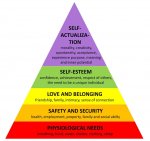Okay let’s talk about self-awareness, a favorite topic of mine.

I think that another concept we can use for self-awareness might be empathy.
Meaning, because you are able to put yourself in the shoes of someone else, you understand them and you also express yourself in a way so you don’t hurt them.
In the medical industry this is very obvious. In many layers of the industry starting from phone operators, assistants, nurses, doctors and anybody else in the chain of things we see that some of them are unable to show empathy. At least try to show empathy.
Because you want to be very careful on how to talk to a cancer patient so you don’t depress them even more. They are trained to be professional but not empathic.
In this group of people, you have the ones who are truly and naturally empathetic with more self-awareness, the ones who at least try to be empathetic and a small minority who aren’t and are rude.
This is also expressed in the body language.
Most of these rude folks seem annoyed, moody and generally tired.
The rest at least smile so they seem friendly and the genuine ones are natural in their glowing of goodwill and it’s obvious that they have a gift to be empathetic and are very self-aware.
Empathy can also be gained with knowledge when you don’t have it as a gift you’re born with.
Meaning, you can gain more knowledge on how to talk to a person of each discipline or profession so you can be understood more clearly by them.
This again makes you more self-aware because you might know how to talk to a person who has been through some sort of tragedy or joy. Let’s not forget joy too.
A person who is not self-aware and who does not have ill-will may say a lot of things that can hurt the other person. And this is where things can get interesting. This simple misunderstanding can result in fights or even wars.
But most of the time, the person who is self-aware is going to forgive the other person who he may label as “less intelligent” to use a kind word.
Then comes the question of who’s more happy? The person who is more self aware or the one who is less?
This is also very complicated but from a Christian POV, we have God who
gives us rest while we lay all our problems and anxieties that come from self-awareness and the knowledge we have accumulated to Him. Becoming very self aware or empathetic may not be good for your health so for us who believers, we have God who we lay all our problems to and we gain more wisdom from our experience without affecting our mental health.
The person who is less self aware, could be argued that it’s more happy than the one with more knowledge and this is assuming they have no ill-will.
Regarding Maslow’s Hierarchy of Needs.
View attachment 269678
I don’t have a lot to say here because I agree completely with that. In fact, there’s an ancient Greek saying which says that “Democracy begins with a full stomach”
About that Forbes article.
The article begins by saying that self-awareness is critical for career success. This is true and it aligns to the knowledge gained I mentioned above but what it doesn’t say is the adaptation part. Where, most of people at work, will go along with the politics so they can stay employed. This is an adaptation mechanism so you can survive.
She also says that out of 95% of the people who are self-aware, only 15% of them actually are.
She cites three reasons for this disconnect. First, we naturally have blind spots. We’re wired to operate on autopilot, unaware of how we’re behaving, and why. There’s also the feel-good effect: we’re happier when we see ourselves in a more positive light. She calls the last factor the “cult of self,” the idea that we’ve become more self-absorbed as social media has exploded in popularity.
The auto-pilot part is the part which I also call adaptation. The majority of people in office settings, follow trends not logic anymore, which is why the rest of the herd follows without questioning because they are afraid to lose their jobs. Adaptation. Survival mechanism to go along on auto-pilot.
To gain more self awareness she says you need two things. Internal and external. For us as Christian, we should get our internal from God hopefully and that’s where I’ve been getting mine.
But for external she says that you need a “mentor” who can help you.
This again, from a Christian perspective is someone who can help you grow In Christ but adding to what I mentioned on an earlier post about experience, you can get more self-awareness by falling and getting up again.
I mean i was blessed to have a monk in my youth to help me grow in this aspect but i realize that everyone has a different journey and one factor that applies to us all is that when we fall, we learn how to get up, get more wisdom and in turn self-awareness.
She says that some people fear that becoming more self-aware means seeing the ugly truth about yourself.
Well, from a Christian POV this also means on how you see sin. If you think of yourself as sinless then you’re blue-pilled (no self-awareness) but if you think of yourself as the Chief among sinners, like Paul did, then you are more red-pilled (more self-awareness).
That's all i can say for now and thanks for opening this topic.

1

